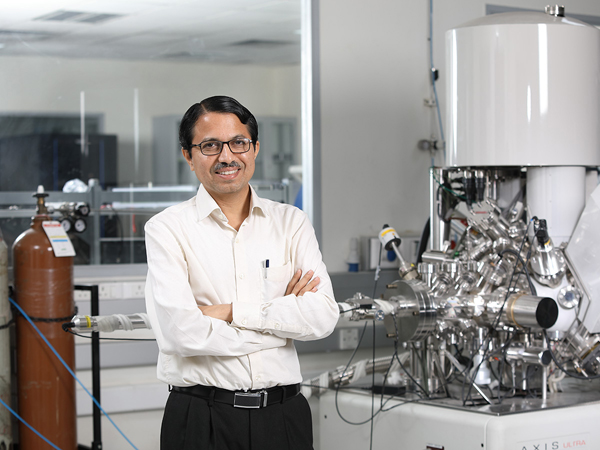The Infosys Prize 2018 in Engineering and Computer Science is awarded to Prof. Navakanta Bhat for his work on the design of novel biosensors based on his research in biochemistry, materials and microelectronics that push the performance limits of existing metal-oxide sensors. He is also recognized for his efforts to build a state-of-the-art infrastructure for research and talent development in nanoscale systems and for developing technologies for space and national security applications.
Infographic:
The Lilliputian Revolution
Scope and Impact of Work
Prof. Navakanta Bhat works at the interface of materials and electro-mechanical devices and systems. As a technologist he takes a whole systems approach that span the range from doing fundamental science to building practical devices and systems that meet carefully calibrated needs to the target application areas. His work has had a wide impact in areas ranging from public healthcare, nation’s atomic energy and space programs to training of future generation of engineers in nanotechnology.
In public health, Prof. Bhat developed electro-chemical sensors that are inherently more robust and stable than conventional enzyme and antibody-based sensing. For instance, his work exploits the copper-albumin binding phenomenon to measure albumin content without separating it from blood serum. Similarly, he developed half a dozen sensors for testing blood and urine markers including testing hemoglobin and HbA1c in blood and creatinine in urine. His work has made it possible to create novel point-of-care health diagnostics for chronic diseases like diabetes, anemia and malnutrition, kidney and liver diseases, some of which are under development through his efforts with the industry.
Prof. Bhat’s work on ultra-precise testing of gases at parts-per-billion accuracy in detecting markers and environmental contaminants is notable for its ingenuity and breadth of applications. He devised sensing of hydrogen and nitrous-dioxide gases based on choice of materials and their nanoscale structures that have been used in the space program and in real-time pollutant monitoring. Bhat has also developed neutron sensors for use in atomic energy installations. These advances are notable not only for their creativity and ingenuity but also their use in critical areas of space and atomic energy where international technological exchanges are significantly restricted.
Beyond contributions to engineering systems and applications, Bhat is to be applauded for his tireless efforts to build a national research network for training talent in nanotechnologies. These efforts include programs such as the Indian Nanoelectronics Users Program and the National MEMS Design Centre and the Indian Science Technology and Engineering Facility Map (I-STEM). Over 17 doctoral students have graduated under his direct supervision, many of who have established thriving research programs at IITs, IISc and national research laboratories. The National Nanofabrication Centre that he co-founded ranks high amongst nanotechnology centers in academia.
Bio
Navakanta Bhat is a professor of electrical and communications engineering at the Indian Institute of Science, Bangalore. Prof. Bhat chairs the Centre for Nano Science and Engineering at IISc. His research focus is nanoscale transistor devices and on novel materials for creating new robust, inexpensive and low-power sensor devices and systems. Before joining IISc, he worked as a device engineer at Motorola in Austin, Texas.
Bhat received a Ph.D. in Electrical Engineering from Stanford University in 1996, an M. Tech. in Microelectronics from IIT Bombay and a B. E. in Electronics and Communications from Sri Jayachamarajendra College of Engineering, University of Mysore, India.
Among his many awards are Dr. Abdul Kalam Technology Innovation National Fellowship (2018), Prof. Rustum Choksi Award (2017), Confederation of Indian Industry Industrial Innovation Award (2017), Fellow of Indian National Academy of Engineering, Swarnajayanti Fellowship (2005), Professor Satish Dhavan Award (2005).
He is author or co-author of more than 250 publications in top technical journals and conferences, 24 patents, and 3 product deliveries to ISRO and Department of Atomic Energy. Bhat is the founder and promoter of a start-up, PathShodh Healthcare Pvt Ltd., which has developed a revolutionary multi-analyte point-of-care diagnostic device for diabetes and associated complications.
Timeline
Jury Citation
Prof. Navakanta Bhat’s work exemplifies a holistic approach to engineering research that advances technology, develops infrastructure to train next generation of engineering talent and works directly with industry and government organizations to deploy these advances. Specifically, Prof. Bhat is recognized for developing novel electrochemical sensors that replace conventional enzyme and antibody based biosensors by fundamentally more stable sensors based on chemical ligands and metal ions. These can lead to better and cheaper testing for diabetes, liver and kidney functions.
Bhat has devised gas sensors with ultra-precise detection accuracies necessary for space and environmental monitoring especially useful for India’s growing space, atomic energy and security programs.
Prof. Bhat is also recognized for his successful efforts to build a national research network for training talent in nanoscale devices and micro-electro-mechanical systems (MEMS).
“My heartiest congratulations to Dr. Navakanta Bhat for his creativity and ingenuity in devising new sensors and nanoelectronic devices. The committee especially appreciated his tireless efforts to build a world-class infrastructure for research and education in nanotechnologies.”




